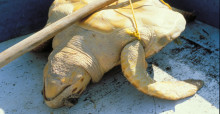Hírek a nagyvilágból
 >
>
UN Initiative to Establish a Global Atlas on Animal Migration Sets Milestone with Launch of New Bird Migration Atlas
Visualizing how migratory animals connect continents, countries, sites and habitats is the result of an international scientific effort under the aegis of the Convention on the Conservation of Migratory Species of Wild Animals (CMS), in developing the first atlas of bird migration across three continents. CMS, an environmental UN treaty, will launch the Eurasian-African Bird Migration Atlas today at the Museum of Migration on the Italian island of Ventotene, as the first part of a broader initiative to develop a global atlas of animal migration.
Statement of Amy Fraenkel, Executive Secretary of the Convention on the Conservation of Migratory Species of Wild Animals on the International Day for Biological Diversity 2022
“Building a shared future for all life” is this year’s theme for the International Day for Biological Diversity (IDB) which will be celebrated around the world on 22 May. The theme captures the spirit behind ongoing efforts to come up with a shared plan – a Global Biodiversity Framework – which will set the global conservation agenda for the next decade.
2022/006: UN General Assembly Resolution: World Seagrass Day
The Secretariat of the Convention on Migratory Species (CMS) is pleased to share with you the proposed text for a UN General Assembly resolution entitled World Seagrass
Ecological Connectivity: An Essential Component of Ecosystem Restoration
With a confluence of unprecedented crises facing the world today, such as relentless environmental changes causing accelerating biodiversity loss, increasing global warming, and advancing land degradation, restoration is key to counter these trends and return nature to a healthy state.
World Migratory Bird Day: Light Pollution Threatens Birds across the World but Solutions are Readily Available
Light pollution and its impact on migratory birds is the focus of World Migratory Bird Day 2022, a global campaign that aims to raise awareness of migratory birds and the need for international cooperation to conserve them. Activities to mark the day will be held globally under the theme “Dim the Lights for Birds at Night”.
2022/005: Funding Relevant to CMS Implementation in GEF-8 Replenishment
The Secretariat of the Convention on the Conservation of Migratory Species of Wild Animals (CMS) is pleased to inform Parties about funding opportunities for migratory
2022/004: World Migratory Bird Day 2022 Campaign Strategy
The CMS and AEWA Secretariats are pleased to share the World Migratory Bird Day 2022 Campaign Strategy with Parties and all relevant stakeholders.
2022/003: Range State Meeting on the Single Species Action Plan for the Angleshark in the Mediterranean Sea
The Secretariat of the Convention on the Conservation of Migratory Species of Wild Animals (CMS) is pleased to announce the Range State Meeting on the Single Species Ac
Avian Influenza Continues to Impact Wild Migratory Birds: The Case of Prespa National Park
On March 11 2022, an outbreak of avian influenza was reported at the Prespa National Park, in Greece, resulting in mass mortality events that have severely impacted the Dalmatian pelican (Pelecanus crispus) nesting population found in the Lesser Prespa Lake. The Dalmatian pelican is classified as Near Threatened according to the IUCN and is protected under the Convention on Migratory Species (CMS) – listed on both appendix I and II – and the African-Eurasian Migratory Waterbird Agreement (AEWA).
New Review Finds the Consumption of Wild Meat of Aquatic Megafauna Protected Under CMS to be Widespread Throughout the Tropics
Published on 21 March was a review of the literature and overview of the contemporary use of aquatic megafauna (cetaceans, sirenians, chelonians, and crocodylians) in the global tropics and subtropics, for 37 species listed on the Appendices of the Convention on Migratory Species (CMS).






